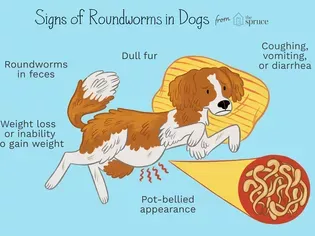Roundworms in Puppies and Dogs
Updated on 05/27/24

Roundworms in Puppies and Dogs: A Comprehensive Guide
Roundworms are a common intestinal parasite that can infect both puppies and adult dogs. They are round, white or cream-colored worms that can range in size from a few inches to several inches long. Roundworms are spread through the ingestion of infected feces, and they can cause a variety of health problems in dogs, including weight loss, diarrhea, vomiting, and malnutrition.
Symptoms of Roundworms in Puppies and Dogs
The symptoms of roundworms in puppies and dogs can vary depending on the severity of the infection. Some dogs may only have mild symptoms, such as a slightly decreased appetite or weight loss, while others may have more severe symptoms, such as:
* Diarrhea
* Vomiting
* Weight loss
* Malnutrition
* Pot-bellied appearance
* Lethargy
* Stunted growth
* Respiratory problems
* Intestinal obstruction
* Death
Diagnosis of Roundworms in Puppies and Dogs
Roundworms can be diagnosed by a veterinarian through a physical examination and a fecal exam. A fecal exam is a test that examines a sample of your dog's feces for the presence of roundworm eggs. Roundworms are relatively easy to diagnose, and treatment is usually straightforward.
Treatment for Roundworms in Puppies and Dogs
Roundworms are treated with oral medication. There are several different types of medication that can be used to treat roundworms, and your veterinarian will recommend the best medication for your dog based on their age, weight, and overall health.
Prevention of Roundworms in Puppies and Dogs
The best way to prevent roundworms in puppies and dogs is to practice good hygiene and to keep your dog's environment clean. Here are some tips for preventing roundworms in puppies and dogs:
* Pick up your dog's feces immediately. This will help to prevent your dog from ingesting infected feces.
* Keep your dog's environment clean. This includes vacuuming your home regularly, washing your dog's bedding, and cleaning up any feces in your yard.
* Don't let your dog eat dead animals. Dead animals can carry roundworm eggs.
* Deworm your dog regularly. Puppies should be dewormed every two weeks until they are 12 weeks old. Adult dogs should be dewormed every six months.
Conclusion
Roundworms are a common intestinal parasite that can infect both puppies and adult dogs. Roundworms can cause a variety of health problems in dogs, including weight loss, diarrhea, vomiting, and malnutrition. The best way to prevent roundworms in puppies and dogs is to practice good hygiene and to keep your dog's environment clean. If you think your dog may have roundworms, it is important to take them to the veterinarian for diagnosis and treatment.
Additional Information
* Roundworms are the most common intestinal parasite in dogs.
* Roundworms are spread through the ingestion of infected feces.
* Roundworms can cause a variety of health problems in dogs, including weight loss, diarrhea, vomiting, and malnutrition.
* The best way to prevent roundworms in puppies and dogs is to practice good hygiene and to keep your dog's environment clean.
* If you think your dog may have roundworms, it is important to take them to the veterinarian for diagnosis and treatment.
Examples of Roundworms in Puppies and Dogs
* Case 1: A 6-week-old puppy was brought to the veterinarian with a pot-bellied appearance, diarrhea, and vomiting. The puppy was diagnosed with roundworms and was treated with oral medication. The puppy's symptoms resolved within a few days of treatment.
* Case 2: A 2-year-old dog was brought to the veterinarian with a history of weight loss and diarrhea. The dog was diagnosed with roundworms and was treated with oral medication. The dog's symptoms resolved within a week of treatment.
* Case 3: A 10-year-old dog was brought to the veterinarian with a history of lethargy and respiratory problems. The dog was diagnosed with roundworms and was treated with oral medication. The dog's symptoms resolved within a few weeks of treatment.
Explore More Pets

Basic Training
Puppy and Baby Introductions

Working Dog Breeds
All About Search and Rescue Dogs

Dog Treatments
Puppy Vaginitis: Signs, Causes and Treatment

Dog Adoption
After More Than 1,200 Days in the Shelter, Coco Goes Home

Basic Training
How to Train Your Puppy to Go on Potty Pads

Hybrid Dog Breeds
The Difference Between a Mutt, Mixed Breed, or Designer Dog?

Dog Treatments
Nail Problems in Dogs

Puppies
7 Reasons Why Two Dogs Are Better Than One
